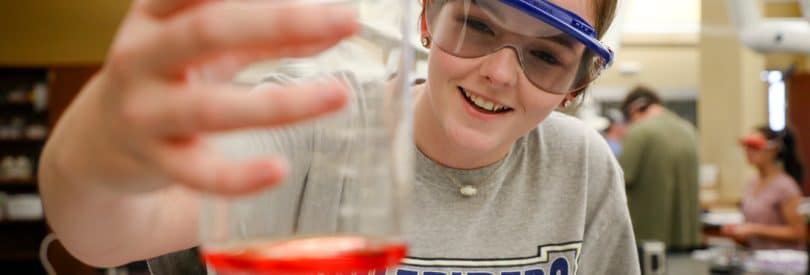
Note: A minimum grade of C is required for all courses in the curriculum.
University Requirement (2 hours)
GSTD 1002 – Freshman Seminar
General Education (18 hours)
English Composition (6 hours)
Fine Arts/Humanities (6 hours)
U.S. History/Government (3 hours)
Social Science (3 hours)
Note: 17 hours of mathematics, biological science, physical science, social science, and fine arts/humanities requirements are included in the major.
Chemical Engineering (55 hours)
CHEG 2053 – Chemical Engineering Fundamentals
CHEG 3063 – Mass Transfer
CHEG 3213 – Thermodynamics II
CHEG 3352 – Chemical Engineering Lab
CHEG 4043 – Reactor Design
CHEG 4023 – Senior Design Project I
CHEG 4033 – Process Control
CHEG 4123 – Senior Design Project II
CHEG 4173 – Chemical Engineering Processes
ENGR 1023 – Introduction to Engineering and ENGR 1021 – Introduction to Engineering Lab
ENGR 1212 – Engineering Graphics
ENGR 2043 – Properties of Materials
ENGR 2143 – Statics
ENGR 3003 – Fluid Mechanics
ENGR 3013 – Thermodynamics
ENGR 3023 – Heat Transfer
ENGR 3073 – Engineering Economics
ENGR 3083 – Numerical Methods in Engineering
ENGR 3211 – Thermal Fluid Science Lab
ENGR 4701 – Work Experience Learning I
ENGR 2020 – Engineering Exams *
*Engineering students must register for this course each fall and spring semester. It will be used as an exam period for all Engineering and Physics courses at the sophomore level and above.
Chemistry (12 hours)
CHEM 1023 – University Chemistry I and CHEM 1021 – University Chemistry I Lab
CHEM 1123 – University Chemistry II and CHEM 1121 – University Chemistry II Lab
CHEM 3003 – Organic Chemistry I and CHEM 3001 – Organic Chemistry I Lab
Computer Science (4 hours)
CSCI 2103 – Computer Science I and CSCI 2101 – Computer Science I Lab
Mathematics (16 hours)
MATH 1525 – Calculus I
MATH 1545 – Calculus II
MATH 2563 – Calculus III
MATH 3033 – Differential Equations
Physics (8 hours)
PHYS 2203 – University Physics I and PHYS 2201 – University Physics I Lab
PHYS 2213 – University Physics II and PHYS 2211 – University Physics II Lab
Other Requirements (6 hours)
ENGL 3023 – Technical Writing
3 hours of upper-level Physics or Engineering electives (ENGR 4123 – Senior Design Project II recommended)
Total Hours – 121
- 2025-2026
- 2024-2025
- 2023-2024 [pdf]
- 2022-2023 [pdf]
- 2021-2022 [pdf]
- 2020-2021 [pdf]
- 2019-2020 [pdf]
- 2018-2019 [pdf]
- 2015-2016 [pdf]
- 2014-2015 [pdf]
- 2013-2014 [pdf]
- 2012-2013 [pdf]
| Department: | |
| Hours Required: | 121 |
| Categories: | Major, Undergraduate |
| Delivery: | On-Campus |
Median Annual Salary: $160,000
2025 AIChE Salary Survey
Chemical Engineers use chemical processes to find innovative ways of producing goods that improve and protect human health, the environment, and the economy. Chemical Engineers are employed across a wide spectrum of industries from traditional chemicals and petroleum-based products to specialty industries such as pharmaceuticals, food, microelectronics, and alternative energy. Chemical engineers also work in energy management, safety, pollution prevention, and waste treatment and disposal.
The curriculum in chemical engineering at SAU includes classroom and laboratory instruction and emphasizes broadly applicable fundamental principles and current technology to prepare graduates for professional practice and professional growth. Students also gain hands-on experience through industry internships that often lead to employment after graduation.
The educational objectives of the chemical engineering program are for graduates of the program to have careers characterized by:
- success in chemical engineering practice, postgraduate education, or other areas’ making use of engineering skills.
- demonstrated success in the formulation and solution of chemical engineering problems.
- ethical behavior in all endeavors.
- demonstrated effectiveness in teamwork, communication, and service to community.
- demonstrated technical and/or managerial leadership.
- demonstrated commitment to lifelong learning.
Learning Goals
- Our graduates effectively communicate scientific knowledge.
- Our graduates have the knowledge to make informed and ethical scientific decisions.
- Our graduates utilize appropriate quantitative skills in making decisions.
- Our graduates demonstrate the information literacy required for scientific study.
- Our graduates possess the knowledge and skills in engineering and the physical sciences to be successful.
